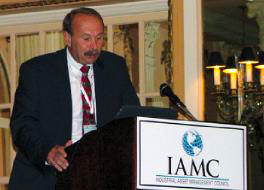
IAMC Building Reserves of Trust and Leadership (cover)
Site Selection Editor Leads Memphis Forum Panel ...
South Carolina Welcomes IAMC and Foreign Investment
Memphis Forum Provides a Global Snapshot; Discussion Programs Complement Expert Presenters
Buchholz: 'Hyper-Competition' Dictates Speed to Market
Executives Advised to Know Risks, Rewards of Offshore Outsourcing
Development Hall of Fame Inducts 3 Honorees

From Site Selection magazine, November 2004
Site Selection Editor Leads Memphis Forum Panel on
"Global Outsourcing: The State of Direct Investment" ...
"Global Outsourcing: The State of Direct Investment" ...
Site Selection Editor Mark Arend moderated a panel on foreign direct investment, specifically on which countries are investing in other
 |
|
Robert Frederickson
|
With so much campaign rhetoric surrounding outsourcing functions to foreign lands and U.S. jobs going overseas, this session was meant to provide Professional Forum attendees with a look at what is actually happening.
Presenters included Robert Frederickson, managing consultant with IBM-Plant Location International, which maintains the Global Investment Locations Database (GILD), and Charles McSwain, with CSX Transportation and Vice Chairman of IAMC. Frederickson's presentation covered investment trends in the past 18 months as tracked by GILD; McSwain shared some results of an AT Kearney survey of corporate executives that identified which global events most influenced location decisions, leading to a discussion among attendees of the factors behind their own decisions.
The GILD data revealed that the U.S. is as much a recipient of direct investment as it is an investor, which makes far fewer headlines but is nonetheless the case. In the first half of 2004, it was the largest destination country in terms of new projects and the third largest in new jobs tied to direct investment, behind India and China. In the Americas, the U.S. leads all other countries in new jobs tied to direct investment, though that lead is shrinking -- it garnered 64 percent of the total in the first half of 2003 and 56 percent in the corresponding period in 2004. But it gained a percentage point in winning new projects with 68 percent in the first half of 2003 and 69 percent this year. These trends are also reflected in Conway Data's New Plant Database.
Frederickson offered a macro view of the effects of offshoring to fill certain jobs. Here, too, Forum attendees heard a balanced view of the topic, rather than a list of all the reasons the practice of offshoring should be abandoned. Analysis has shown that in many cases, offshoring helps U.S. companies remain competitive, results in cheaper prices to U.S. consumers, frees up human resources for deployment elsewhere in the company and increases demand for U.S. products offshore.